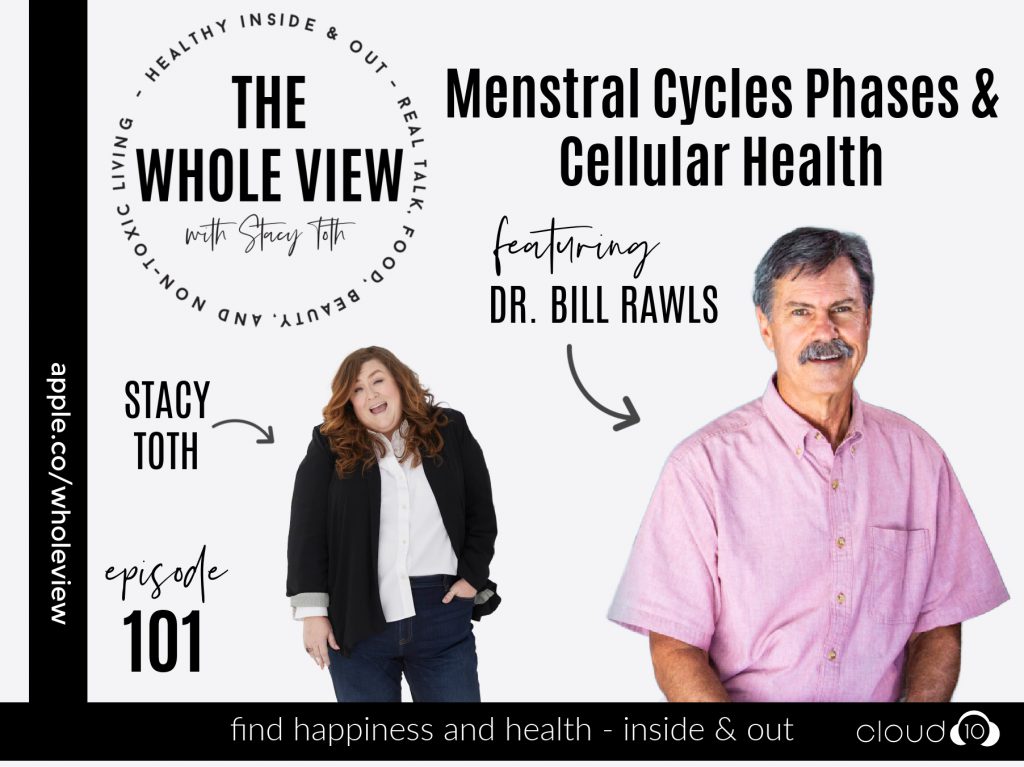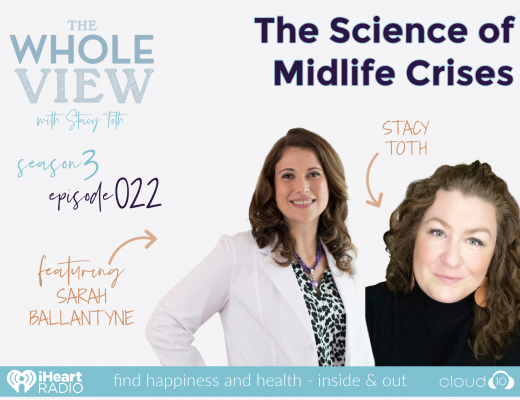Retired OB/GYN and author Dr. Bill Rawls joins Stacy to explain why staying healthy at the most basic level, our cells, benefits our overall health, immunity, and hormones. We also dive into the what, how, and why of each phase of the menstrual cycle and the roles of estrogen and progesterone during this complex process.

Find Dr. Rawls:
If you enjoy the show, please leave a review. Letting people know on iTunes or however you listen that it’s worth their time could change someone’s life!
Key Takeaways
Introductions
- Dr. Rawls is a 4th-generation physician who left his OB-GYN practice after Lyme disease and fibromyalgia disrupted his career in his forties. To regain his health, he threw himself into researching how to survive and eventually thrive by embracing lifestyle changes. Now, at age 66, he’s an active outdoor enthusiast in the best shape of his life!
- Taking what he learned from his healing journey, Dr. Rawls helps others understand how true wellness begins at the cellular level in his recent bestselling book, The Cellular Wellness Solution: Tap Into Your Full Health Potential with the Science-Backed Power of Herbs.
- Specifically, for those of us who menstruate, science hasn’t done a good job of helping us understand our bodies, how they not only vary from the other sex, but how to harness the power of our cycles.
Cellular Health
- If your cells are healthy then you’re going to be healthy. Dr. Rawls notes that when you look at a cell, all cells need some basic requirements to be healthy. And if you’re meeting those requirements, you’re in pretty good shape:
- The right nutrients
- Clean environment (today we’re exposed to a lot of environmental toxins chiefly from burning coal and petrochemicals, plastics, and those types of things, is inhibiting cellular functions. Not one cell, every cell type in the body)
- Downtime (if you’re not sleeping, they’re going to be stressed)
- Good blood flow (moving regularly)
- Additionally, protections from microbes are important, which can include barriers (i.e. linings), your immune system, and cells that can expel or destroy.
- Linings are meant to keep foreign microbes out and keep resident microbes in. All of our tissues and cells are potential food for microbes.
- However, most people don’t get super sick with low-grade pathogens (like ticks); but how bad a microbe is, is really more about whether you have built-in immunity, rather than the microbe itself. Ticks tend to win by stealth, not by brute-force.
- The concept of dormancy is continuing to be studied.
Menstrual Cycle Phases
- We are basically biological machines made up of cells that function. And when you look at a menstrual cycle it is that process of forming an egg and releasing an egg, and then pregnancy occurring or not occurring that carries us through that phase. It’s a fairy complex mechanism.
- When we are considering menstruation and these cycles, from the hormone fluctuations changing our moods to energy surges, learning what we can expect of ourselves can help us maximize that time like building in rest or productivity, planning a heavy lifting session, or setting aside time for creative projects:
- Menstruation – nutrients drop with blood loss, need to feed mitochondria with lots of vegetables, more protein than fat
- Follicular phase – higher estrogen levels triggers the hypothalamus, stimulating higher energy levels or potentially stress or anxious
- Ovulation – begins once egg is released, secretes progesterone to prepare uterus for potential pregnancy or egg to be absorbed if not implanted, calming de-energizing, potentially depression
- Luteal phase – high progesterone, loose joints, mood fluctuations, PMS/PMDD
- Every cell in the body has estrogen receptors. So when you are going through the follicular phase and the estrogen is increasing, it’s telling cells throughout the body that they need to get ready! So it’s affecting brain cells, heart cells, everything throughout the body, but certain cells in very specific ways to prepare for ovulation.
- The hypothalamus is like our thermostat, receiving signals from what is going on in the body and brain, monitoring the adrenal, thyroid, and ovaries, working through the pituitary. The pituitary is like the secretary, sorting and sending out
- Altogether results show, that up to 90% of women of reproductive age experience several premenstrual symptoms varying from mild to severe; around 20–40% of them experience PMS, and 2–8% suffer from premenstrual dysphoric disorder (PMDD) [source]
Studies, References & Products
- Prevalence and clinical picture of premenstrual syndrome in females from Bulgaria, Annuals of General Psychiatry
- Understanding the Four Phases of the Menstrual Cycle
Sponsors
- Vegamour.com/WHOLEVIEW | Use code WHOLEVIEW to get 20% off your first order
- Indeed.com/WHOLEVIEW | Get a $75 sponsored job credit
- Beautycounter.com/StacyToth | Go to Realeverything.com/podcast for a customized skin guide and CLEANFORALL20 for 20% off your first order
Want more info on our Real Life? Healthy recipes, parenting tips, and general lifestyle stuff goes out in our Real Everything newsletter, join here.
So never want to miss a post, sale, or deal? Join my Healthy Inside & Out e-mail list for more info on non-toxic living and safer skincare!




